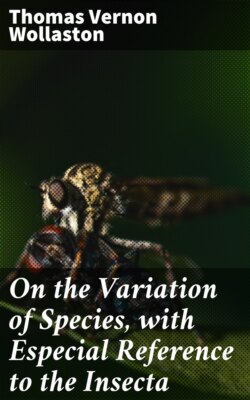On the Variation of Species, with Especial Reference to the Insecta

Реклама. ООО «ЛитРес», ИНН: 7719571260.
Оглавление
Thomas Vernon Wollaston. On the Variation of Species, with Especial Reference to the Insecta
On the Variation of Species, with Especial Reference to the Insecta
Table of Contents
PREFACE
CORRIGENDUM
CHAPTER I. INTRODUCTORY REMARKS
CHAPTER II. FACT OF VARIATION
Footnote
CHAPTER III. CAUSES OF VARIATION
§ I. Climatal causes generally, whether dependent on latitude or altitude
§ II. Temporary heat or cold, of an unusual degree
§ III. Nature of the country and of the soil
§ IV. Isolation; and exposure to a stormy atmosphere
Footnote
CHAPTER IV. ORGANS AND CHARACTERS OF VARIATION
Footnote
CHAPTER V. GEOLOGICAL REFLECTIONS
Footnote
CHAPTER VI. THE GENERIC THEORY
Footnote
CHAPTER VII. CONCLUSION
INDEX
Отрывок из книги
Thomas Vernon Wollaston
Followed by an Inquiry into the Nature of Genera
.....
Perhaps we are too prone to regard those specific characters, which are so subtle that they cannot be grasped by our clumsy faculties except in their broadest and plainest features, as incapable of fluctuation. Yet a practised eye can detect discrepancies innumerable in specimens which appear absolutely alike to one that is uneducated; whilst a third person, better qualified still, will trace out other and more delicate distinctions, with even greater precision. And thus it is that we rise, step by step, even amongst the humbler representatives of the animal kingdom, to the comprehension of that great truth which is so conspicuous in the nobler ones, and which we have already summoned to our aid, that "there is no similitude in Nature which owneth not also to a difference." Let us not forget that the sphere of our senses is limited; and that, although tuition will do much to enlarge their capacity for perception, we are at the best but a dim-sighted race: hence, we should be careful to avoid conclusions which are not warranted by analogy, and which our understanding, as it becomes gradually brighter, no less assuredly condemns. True it is, that we may not be able, as in the higher animals, to appreciate the differences between individuals without a rigid inspection, and that sometimes we may fail to do so even when the objects are critically examined; yet the fact that new peculiarities do unquestionably open out upon us, as we become more and more trained for the recognition of them, ought to warn us that others may exist likewise, despite our primâ-facie conclusions; whilst analogy with what we know to be the case in other departments of the organic world should suggest, unless indeed there is presumptive evidence to the contrary, that they in all probability do.
The Alpine range, when seen from afar, appears a monotonous mass of a dull uniform hue; and nothing, of all the wondrous details which it includes, can be distinguished, except perchance the outline of its jagged peaks projected in faint relief against the distant sky. One by one, however, as we approach it, inequalities present themselves; the surface which lately seemed so uniform and grey that it could be compared only to a cloud, is found to be cleft by ravines; and valleys, in all their magnificence and breadth, expand slowly to our view. Yet, marvellous as is the change, this is not all: wood and water, without which the landscape would be barren, are in turn revealed; whilst the play of light and shade upon the mountain-slopes proclaims at length that the picture is well nigh complete. Still more to be disclosed does in reality remain; and we must advance nearer yet if we would either fully realise the whole, or enter into the surprising minutiæ of each of its component parts. And so it is with the objects which we have been just discussing. When contemplated in a mass, and by an uneducated eye, hosts of them may appear to be identical; but as our vision becomes clearer and more acute, differences, formerly inappreciable, are gradually made manifest,—until at last we can detect modifications innumerable, throughout the entire length of the living panorama; and are enabled to endorse the belief (repugnant à priori though it be), that individual variations, even to the extent which I have ventured to suggest, are not incompatible with specific similitudes.
.....